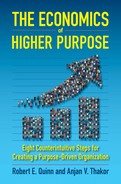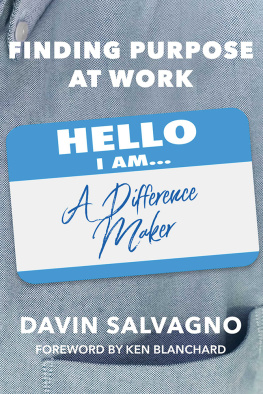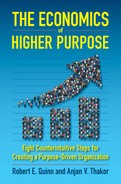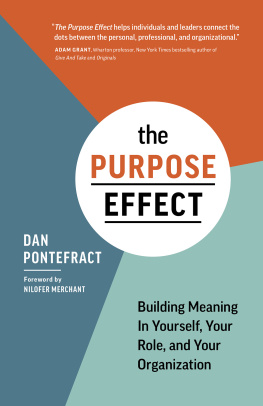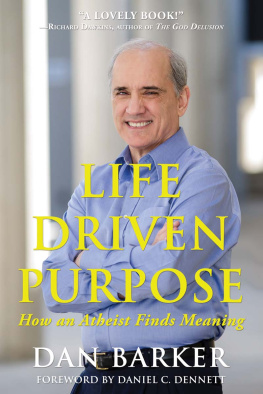Praise for The Economics of Higher Purpose
Quinn and Thakor create a powerful case and practical guide for why and how we should run into a burning building. Their eight counterintuitive steps for purpose-driven management are a must-read for leaders who understand that all you can command is attendance, and all the good stuff is given willingly by those that understand and share the higher purpose of their organization.
Jim Mallozzi, former Chairman and CEO, Prudential Real Estate and Relocation Services
As an HR leader, I am constantly thinking about how to provide a richer, more meaningful work experience. The Economics of Higher Purpose provides a compelling blueprint to help our people connect to a deeper purpose in their work. If this is done well, work becomes more than a paycheck; it satisfies our desire to be a part of something bigger.
Shawn P. Patterson, Vice President of Organizational Effectiveness and Chief Learning Officer, DTE Energy
In this book, Quinn and Thakor teach us a great yet challenging lesson: when we learn to look beyond profit maximization to a higher purpose, we learn to create lasting prosperity.
Charles C. Manz, Nirenberg Chaired Professor of Leadership, University of Massachusetts Amherst, and coauthor of Twisted Leadership and Twisted Teams
In their new book, Quinn and Thakor share amazing insights and stories on how higher purpose turns everyone into a fully invested person. This volume is a profound playbook for those who want to unleash the human and economic power in the people around them.
Jim Haudan, Chairman, Root Inc.
The authors take us on a compelling journey in which we discover the why and the how of creating organizations of higher purpose. Then they give us the gift of practical tools and exercisesit is a precious volume for those who want to make a difference.
Nick Craig, author of Leading from Purpose
By discovering what has made some organizations so hugely successful, Thakor and Quinn give higher purpose the instrumental role it deserves in everybodys life project, large or small. They have written a fantastic, eye-opening book. It is both visionary and highly practical. I have followed their rules unknowingly for the better part of my life.
Jan Krahnen, Professor of Finance, Goethe University, and Founding Director, Sustainable Architecture for Finance in Europe
Everyone has a brand. This book will teach you how to translate your purpose, vision, and values into a strong personal and professional brand. The book leads you on a journey that will help you understand the power of your personal brand and nurture its evolution throughout your career.
Dave Ulrich, Rensis Likert Professor, Ross School of Business, University of Michigan, and Partner, The RBL Group
The Economics of Higher Purpose
Eight Counterintuitive Steps for Creating a Purpose-Driven Organization
ROBERT E. QUINN
ANJAN V. THAKOR

The Economics of Higher Purpose
Copyright 2019 by Robert E. Quinn and Anjan V. Thakor
All rights reserved. No part of this publication may be reproduced, distributed, or transmitted in any form or by any means, including photocopying, recording, or other electronic or mechanical methods, without the prior written permission of the publisher, except in the case of brief quotations embodied in critical reviews and certain other noncommercial uses permitted by copyright law. For permission requests, write to the publisher, addressed Attention: Permissions Coordinator, at the address below.

| Berrett-Koehler Publishers, Inc.
1333 Broadway, Suite 1000
Oakland, CA 94612-1921
Tel: (510) 817-2277, Fax: (510) 817-2278
www.bkconnection.com |
Ordering information for print editions
Quantity sales. Special discounts are available on quantity purchases by corporations, associations, and others. For details, contact the Special Sales Department at the Berrett-Koehler address above.
Individual sales. Berrett-Koehler publications are available through most bookstores. They can also be ordered directly from Berrett-Koehler: Tel: (800) 929-2929; Fax: (802) 864-7626; www.bkconnection.com
Orders for college textbook/course adoption use. Please contact Berrett-Koehler: Tel: (800) 929-2929; Fax: (802) 864-7626.
Distributed to the U.S. trade and internationally by Penguin Random House Publisher Services.
Berrett-Koehler and the BK logo are registered trademarks of Berrett-Koehler Publishers, Inc.
First Edition
Hardcover print edition ISBN 978-1-5230-8640-5
PDF e-book ISBN 978-1-5230-8641-2
IDPF e-book ISBN 978-1-5230-8642-9
Digital audio ISBN 978-1-5230-8644-3
2019-1
Book producer and text designer: BookMatters, Berkeley
Cover designer: Leslie Waltzer, Crowfoot Design
Copyeditor: Mike Mollett
Proofer: Janet Reed Blake
Indexer: Leonard Rosenbaum
CONTENTS
PREFACE
Professors of management and professors of finance speak two different languages, so communication among them is very limited. The two of us, Bob and Anjan, not only talk, we cherish talking. We cherish it because we have a higher purpose. We love learning, and we both yearn to help others gain the love of learning. When we talk together, we not only move forward, we also flourish. We flourish because we have established such a high-quality connection that we make each other better. When we spend a day together, we spend weeks afterward unpacking all the new ideas.
For more than twenty years, we have traveled the globe together running workshops, making presentations, and interviewing senior executives. As we have had these rich experiences, each of us has always been incredibly interested in what the other thinks. We take an experience that captivates us on a given day. Then we collectively ponder it. We explore it from the perspective of management theory. Then we analyze it from the perspective of financial theory. Then we seek to integrate what we have learned. As we do this, we become bilingual as we learn to speak a little more of each others professional language, and we take on a more inclusive mind-set in which differences can be integrated.
Since neither of us fully understands what the other is talking about, we have to pay close attention. We also have to reduce complex ideas down to notions with which the other can connect. We also have to become vulnerable. We have to expose our ignorance and confess that we do not understand. Since we both respect and trust each other, we are comfortable exposing our ignorance as we join in mutual exploration.
A relationship of purpose, trust, vulnerability, and learning often gives rise to new capacities. The capacities are real. There have been times when we have put together a major presentation, requiring the integration of complex concepts, in less than five minutes. If one of us did the same task with a different person, it would take days. We are able to do this because we live in a relationship based on trust, and trust gives rise to collective intelligence. Together, we can do extraordinary things.

